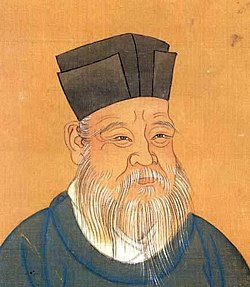
Back Zhu Xi Afrikaans Zhu Xi ALS Zhu Xi AN تشو شي Arabic تشو شى ARZ Zhu Xi AST Çju Si Azerbaijani چو هسی AZB Чжу Си Bashkir Džu Si BAT-SMG
Zhu Xi | |||||||||||||||||||||||||||||||
|---|---|---|---|---|---|---|---|---|---|---|---|---|---|---|---|---|---|---|---|---|---|---|---|---|---|---|---|---|---|---|---|
 | |||||||||||||||||||||||||||||||
| Born | October 18, 1130 Youxi, Fujian Circuit, Southern Song dynasty | ||||||||||||||||||||||||||||||
| Died | April 23, 1200 (aged 69) | ||||||||||||||||||||||||||||||
| Occupation(s) | Calligrapher, historian, philosopher, poet, politician | ||||||||||||||||||||||||||||||
| Philosophical work | |||||||||||||||||||||||||||||||
| Era | Medieval philosophy | ||||||||||||||||||||||||||||||
| Region | Chinese philosophy | ||||||||||||||||||||||||||||||
| School | Neo-Confucianism | ||||||||||||||||||||||||||||||
| Chinese name | |||||||||||||||||||||||||||||||
| Chinese | 朱熹 | ||||||||||||||||||||||||||||||
| |||||||||||||||||||||||||||||||
| Alternative Chinese name | |||||||||||||||||||||||||||||||
| Chinese | 朱子 | ||||||||||||||||||||||||||||||
| Literal meaning | "Master Zhu" | ||||||||||||||||||||||||||||||
| |||||||||||||||||||||||||||||||

Zhu Xi (Chinese: 朱熹; [ʈʂú ɕí]; October 18, 1130 – April 23, 1200), formerly romanized Chu Hsi, was a Chinese philosopher, historian, politician, poet, and calligrapher of the Southern Song dynasty. As a leading figure in the development of Neo-Confucianism, Zhu Xi played a pivotal role in shaping the intellectual foundations of later imperial China. He placed great emphasis on rationality, opposed mysticism and religious experience, and constructed a huge philosophical system.[1] His extensive commentaries and editorial work on the Four Books became the core texts of the imperial civil service examinations from 1313 until their abolition in 1905. He advanced a rigorous philosophical methodology known as the "investigation of things" (格物) and emphasized meditation as an essential practice for moral and intellectual self-cultivation. Zhu Xi's thought exerted profound influence, becoming the official state ideology of China from the Yuan dynasty onward, and was later adopted in other East Asian countries such as Japan, Korea, and Vietnam. In these regions, his Neo-Confucian doctrines were institutionalized through educational systems and civil service examinations, shaping political ideologies, social hierarchies, and cultural values for centuries.
Zhu was a scholar with a wide learning in the classics, commentaries, histories and other writings of his predecessors. In his lifetime, he was able to serve multiple times as a government official,[2] although he avoided public office for most of his adult life.[3] He also wrote, compiled and edited almost a hundred books and corresponded with dozens of other scholars. He acted as a teacher to groups of students, many of whom chose to study under him for years. He built upon the teachings of the Cheng brothers and others, further developing their metaphysical theories in regards to Li (Forma) and Qi (Materia). His followers recorded thousands of his conversations in writing.[2]
- ^ Lai, Chen (2000). 朱子哲学研究 [Studies on Zhu Xi's Philosophy] (in Chinese). Central China Normal University Press. ISBN 7561723628.
- ^ a b Ebrey, Patricia Buckley (1993). Chinese civilization: a sourcebook (2nd ed.). New York: The Free Press. pp. 172. ISBN 0-029-08752-X. OCLC 27226697.
- ^ Slingerland, Edward (2006). The Essential Analects: Selected Passages with Traditional Commentary. Hackett. pp. 148–149. ISBN 1-603-84346-9.